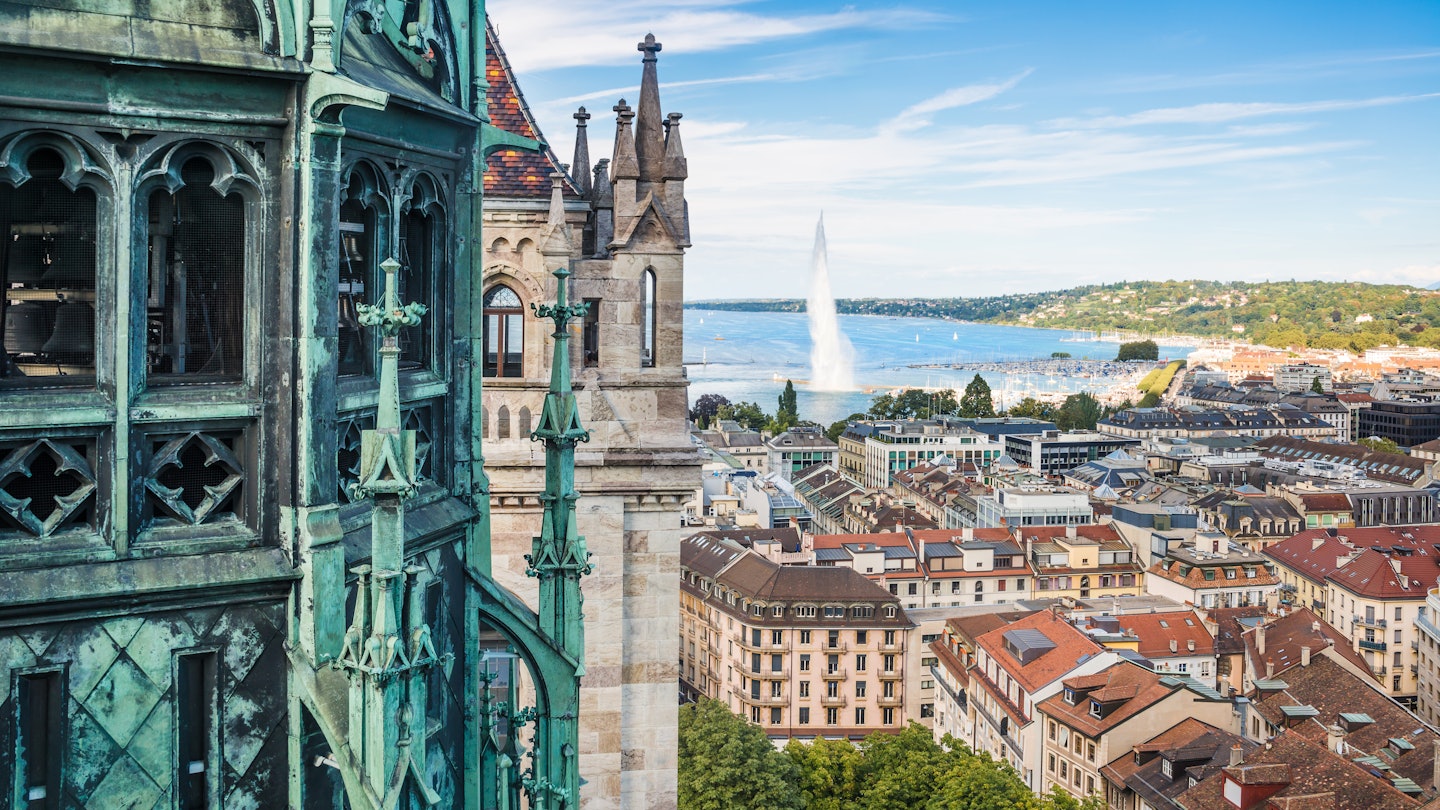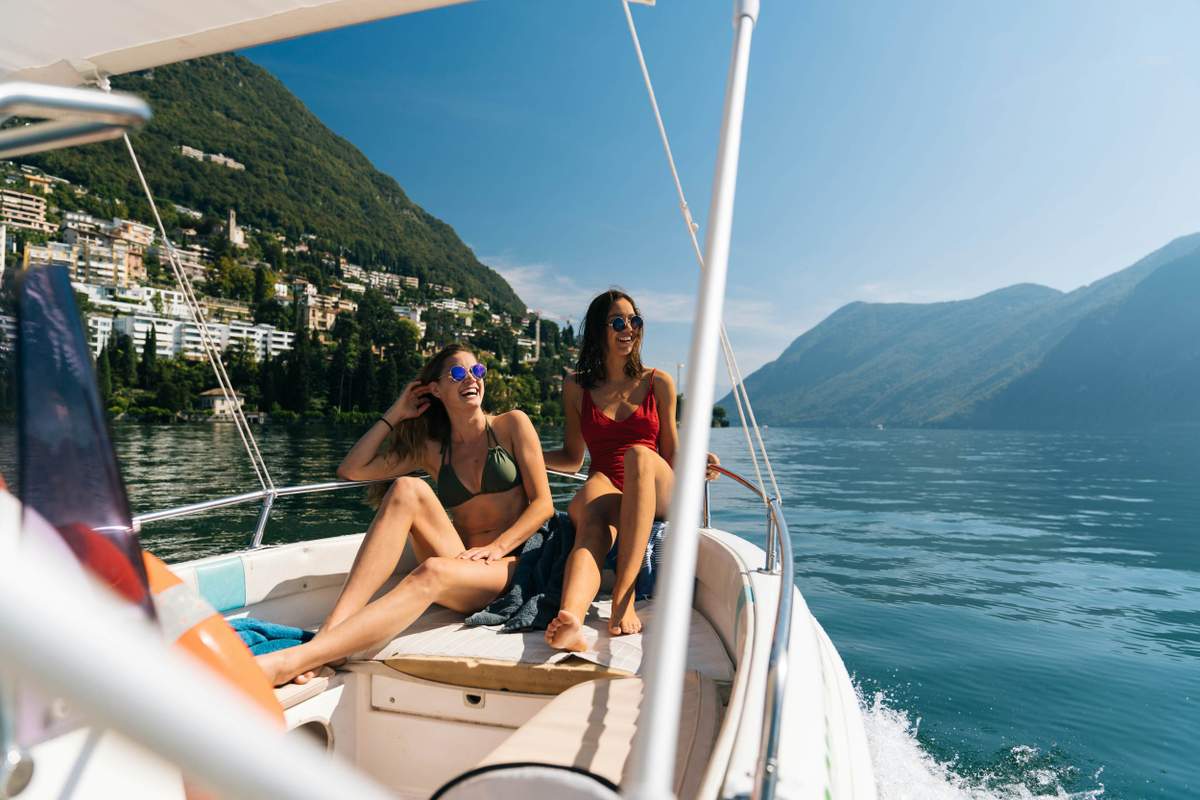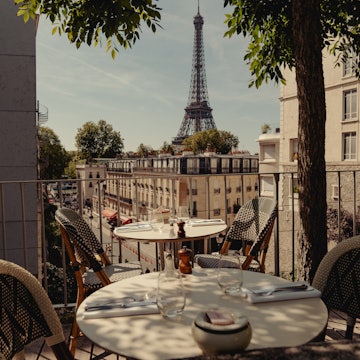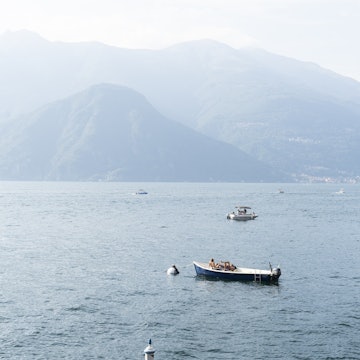

Overlooking Lake Geneva. Alexander Demyanenko/Shutterstock
Wedged like a croissant between Switzerland and France, Lake Geneva – or Lac Léman, as the francophone locals call it – is irresistible. If you could pick all Central Europe’s best bits and squeeze them into one neat package, this is what you would find. Riveting views of the Alps? Check. Sparkling beaches and waters? Check. Vineyards producing outstanding wines? Check. Fairy-tale châteaux and luxury lakeside manors? Check. Pretty medieval old towns topped off with whopping great Gothic cathedrals? Check. Galleries pulsing with contemporary art? Check. Fabulous food? You get the picture… These people know how to live.
But don’t just take our word for it. This lake is ripe and ready to be explored, and doing so is a pleasure, whether on foot, by boat, rail or bike. Our first-time guide to Lake Geneva lets you dive straight in at the deep end.
When should I go to Lake Geneva?
With highs nudging a balmy 30°C (86°F) and plenty of action on and around the water, you won’t miss the sea for a second if you visit Lake Geneva in July and August – just book well in advance. Things are busier in summer, but boats whisking you across the lake to quieter shores and trails threading up into the surrounding Alps offer the opportunity to cool off. Summer is the best for swims, beach days and evenings spent hanging out at pavement cafes. Everywhere leaps to life, with parties, picnics and festivals. June brings classical music to the vines at the Lavaux Classic, while in July unmissables include the Montreux Jazz Festival (the world’s second biggest), Nyon’s massive rock fest Paléo and Lausanne’s street art Festival de la Cité.
Expect fewer crowds in Spring with glorious weather and warm days ideal for walking, cycling and exploring. Lakeside parks and gardens are in full bloom then, too (check out Morges’ tulip festival). In fall, trees are golden, and the scent of new wine hangs in the breeze as the harvest gets underway in the terraced vineyards of the Lavaux. Geneva charms in winter, with twinkly Christmas markets serving vin chaud (mulled wine), chocolate-cauldron smashing and historical torchlit parades at L'Escalade, as well as nearby skiing in the Alps, but expect high room rates.

How much time should I spend in Lake Geneva?
You could get a flavor of Geneva and a nearby town or two in the space of a long weekend, but – let’s face it – the longer you have, the better. Realistically, it would be best to devote at least five days to doing Lake Geneva justice. This would give you time to spend two to three days taking in Geneva’s big-hitter museums and sights, cathedral-topped old town, waterfront gardens and sizzling food scene, before striking out further.
And it would be rude not to. Boats and trains make zipping around and across the lake a breeze. You could easily tag on an extra couple of days to see the culture-crammed town of Lausanne, the UNESCO World Heritage terraced vineyards of the Lavaux (kick off in pretty-as-a-picture Vevey) and fancy, flowery Montreux – the best base for visiting Château de Chillon, a castle freshly minted for a Disney royal. A week or more? Wise choice.
Is it easy to get in and around Lake Geneva?
In a word: yes. Geneva is brilliantly connected. Its international airport links up to most major cities in Europe and numerous worldwide destinations. The area is also served by budget airlines including Swiss, British Airways and easyJet. Bonus: stay overnight in Geneva, and you will immediately be given a free Geneva Transport Card, which covers all local buses, trains and mouettes (yellow shuttle boats).
SBB rail connections are predictably excellent, frequent and run like Swiss clockwork, making it quick and easy to hop between cities, towns and villages along the lake. As an example, from Geneva, it takes 40 minutes to reach Lausanne, 55 minutes to Vevey and 1 hour to Montreux. Buses and boats bridge the gaps.
CGN runs passenger boats to destinations around Lake Geneva (including France). Boats run regularly, especially during the peak summer months. You can hop on and off as you choose by buying a one-day pass (Sfr90/US$112 per adult; Sfr45/US$56 per child) for unlimited lake travel. Family passes are also available.

Top things to do on Lake Geneva
Hit the water in Geneva
With glacier-capped Mont Blanc puckering up on the horizon and the great expanse of Lac Léman (Lake Geneva), glittering at its feet, Geneva looks like a million dollars. While you’ll inevitably want to see big-hitters like the sky-high, rainbow-kissed Jet d’Eau fountain and Gothic Cathédrale St-Pierre in the petite, alley-woven Vielle Ville, the city really works its magic on warm days, when its residents decamp to the lakefront. Go for a picnic in prettily landscaped gardens like Parc Mon Repos and La Perle du Lac. Take the plunge with a refreshing swim or stand-up paddleboarding session at the hip and happening Bains des Pâquis on the Quai du Mont-Blanc.
Take a nostalgic lift to Rochers de Naye
When Montreux fills with jazz festival-goers and Freddie Mercury fans in summer, give the crowds the slip by hopping on the cogwheel train up to 2042m-high (6699ft) Rochers de Naye. The peak has front-row views of Lake Geneva and the Swiss and French Alps that reach all the way from Eiger to Mont Blanc on cloudless days. At the top, you get a proper shot of the mountains, with hiking trails threading to wildflower-strewn pastures, Alpine gardens and wildlife parks where you can spot burrowing marmots.
Explore medieval fantasy castle Château de Chillon
Few castles rival Château de Chillon for fairy-tale looks. A medieval riot of ramparts, turrets and towers, the château is a mood-lifting, half-hour walk along a flowery promenade from Montreux. And my, my what a beauty it is – with insanely dreamy views of Lake Geneva and the French Alps that get all the lovelier as day sinks into pink-purple sunset and the castle begins to glow gold. These thick walls have inspired everyone from Turner and Mary Shelley to Lord Byron, who recounted their gory history in his poem The Prisoner of Chillon. Go for a self-guided tour of the courtyards, vaults and spooky dungeons.

Ride cultural rails at Lausanne’s Plateforme 10
With its swoon-worthy Alpine backdrop, hilly medieval center and shimmering lakeshore, Lausanne has got the looks, but Switzerland’s fourth-biggest city has also got edge and attitude. Go for a coffee and gallery mooch in the new-wave, post-industrial Flon district, then swing over to Plateforme 10, an architecturally striking, on-the-pulse arts district in revamped train sheds, with an outstanding clutch of museums zooming in on photography, fine arts and contemporary art and design.
My favorite thing to do on Lake Geneva
I’m a sucker for a glass of vin with a view, and you get the best of both in the UNESCO-listed vineyards of Lavaux, staggering high above the shores. They never look lovelier than when the last gold-pink light of day touches the lake like a caress. The main grape grown here is Chasselas, which makes crispy, flinty, citrusy white wines that taste like summer in a glass.
Whether I’m here for a walk among the terraced vines, with staggering views of Lake Geneva and the Alps on the horizon, or for a dégustation (tasting) in one of the small-scale, family-run caves as the harvest gets underway, the Lavaux really is a little slice of heaven on earth. They say these grapes are blessed by three suns: the one in the sky, the one on the lake and the one radiating heat from the dry-stone walls.

How much money do I need for Lake Geneva?
Lake Geneva isn’t cheap by any means, and at the luxe end of the spectrum, prices go through the roof. That said, there are lots of clever ways to save francs – buying day passes for public transport, swapping swanky hotels for lakeside campgrounds, no-frills hostels or Airbnb apartments, grazing markets for picnic lunch fixings or looking out for good-value plat du jour lunch specials. It’s worth bearing in mind that admission is free to most of the city’s museums on the first Sunday of the month.
Dorm bed in a hostel: Sfr50 (US$57)
Double room in a budget hotel: from Sfr100 (US$113)
Boutique hotel double: Sfr250 to Sfr500 (US$283 to US$567)
Ingredients for a picnic by the lake: Sfr20 (US$23)
24-hour Geneva City Pass (free or discounted entry to 60 sights): Sfr30 (US$34)
Single public transport ticket: Sfr3 (US$3.40)
Museum entry: Sfr10 (US$11.33)
Coffee: Sfr4 to Sfr8 (US$4.53 to US$9.06)
Beer at the bar: Sfr7 to Sfr9 (US$7.93 to US$10.20)
Three-wine tasting in the Lavaux: Sfr20 (US$23)
Fixed-price two-course menu: Sfr40 to Sfr70 (US$45 to US$79)
Fondue moitié-moitié (Gruyére and Vacherin Fribourgeois cheese): Sfr25 to Sfr30 (US$28 to US$34)
Tasting menu in a Michelin-starred restaurant: Sfr150 to Sfr200 (US$170 to US$227)
One lake, two countries
Factor in a little extra time on and around Lake Geneva to explore the French shores of the lake, too, where stunners like the castle-topped medieval village of Yvoire and the genteel spa town of Évian-les-Bains await. In winter, combine a stay on the lake with snow fun in the mountains: the holy grail of French skiing, Chamonix, in the shadow of mighty Mont Blanc, is just an hour away.
Prefer to explore on two wheels? Rent a bike with Genèveroule and you can pedal the well-marked, 190km (118-mile), mostly gentle Tour du Lac Léman, which shadows the shores as it makes a loop of the entire lake.
















